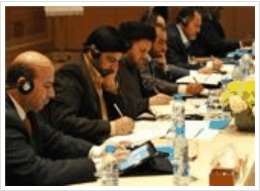
Drafted and adopted by a referendum in 2005, the Iraqi constitution outlines the structure of the federal government and stipulates what bodies should form its legislative, executive and judicial branches.
The legislative branch is to consist of the Council of Representatives (CoR; the Iraqi parliament) and the Federation Council, an ‘upper chamber’ of parliament that is broadly analogous to senates or upper houses in other parliamentary systems and is intended to represent regions and governorates.
The Federation Council can enhance the separation of powers, serve as a buffer between the executive branch and the lower legislative chamber, and afford the regions and governorates and their constituents a greater voice within the central government.
Due to a lack of consensus among Iraqi political leaders on the composition, powers and procedures of the Federation Council, however, the enabling legislation that must be enacted by the CoR to establish this Council has been pending ever since.
UNAMI is mandated to advise, support and assist the Government of Iraq in the enactment of the constitutionally mandated laws, the establishment of the constitutionally mandated institutions, and the advancement of the country’s unfinished constitutional agenda.
The Mission therefore actively supports the CoR’s work on the Federation Council and contributes to the discussions on the issue by sharing international best practices and comparative experiences.
The Federal Supreme Court’s decision on 1 October on the legislative procedure for the enactment of the enabling law of the Federation Council and the subsequent endorsement of a resolution to commence the enactment procedure by the CoR on 9 October gave new momentum to the issue.
The ‘Roundtable on the Constitutional and Legislative Dimensions of the Federation Council’ organized by UNAMI and the CoR in Beirut on 8-10 December 2012 sought to capitalize on this.
Chaired by the First Deputy Speaker of the CoR, Dr. Qusay al-Suhail, and the Deputy Special Representative of the Secretary-General (DSRSG) for Political Affairs, Mr. Gyorgy Busztin, the three-day event provided representatives of political blocs and parliamentary committees with an opportunity to review key principles of the enabling law of the Federation Council and to study different models from countries with two legislative chambers in more depth.
The participants discussed the possible composition and powers of the Federal Council, the body’s relationship with the CoR, Council of Ministers and Governorate Councils, as well as whether it should have a veto on legislation.
Federalism expert George Anderson from the United Nations Department of Political Affairs in New York gave presentations on bicameral legislatures in federal and unitary regimes, international experiences of fiscal federalism, and on the role and membership of upper houses of parliament around the world.
An expert from the Shura Council, Dr. Abdullateef El-Naef, was invited to comment on the presentations, while the Governor of Baghdad, Dr. Salah Abdulrrazaq, and the Chairman of the Provincial Council of Ninewa, Mr. Jabr Al-Abd Rabbu, provided the parliamentarians with a governorate-level view of the issues under discussion.
DSRSG Busztin stressed to the participants that the UN is ready to be a partner to the CoR in establishing a body that is adapted to the specific context in Iraq and that, in particular, contributes to protecting the rights of vulnerable groups and of minorities.
He expressed his hope that the event would “contribute immensely to the deliberations in the Council of Representatives on the draft law and, ultimately, help to create an effective upper legislative chamber that will promote the consolidation of democracy in Iraq.”
Deputy Speaker al-Suhail believed that progress had been made towards achieving this goal. He expressed his gratitude to UNAMI for the good cooperation and coordination that had resulted in what he considered a very successful event that had allowed the organizers to collect ideas and opinions that would shape the relevant legislation.





